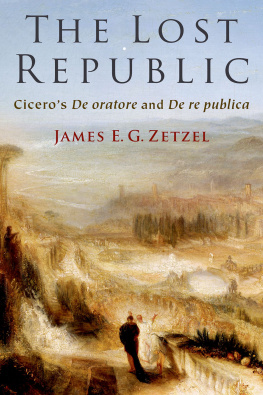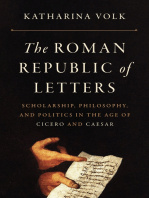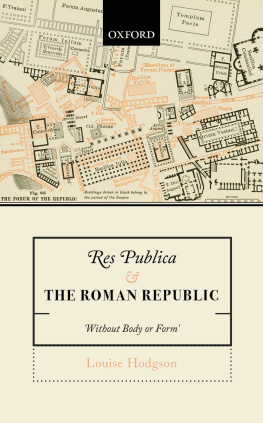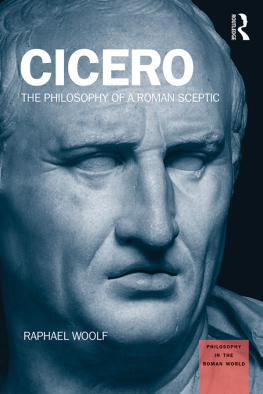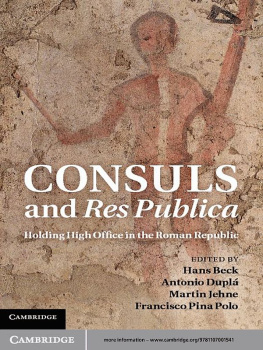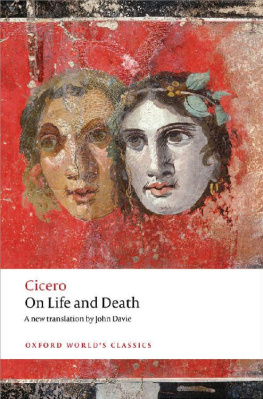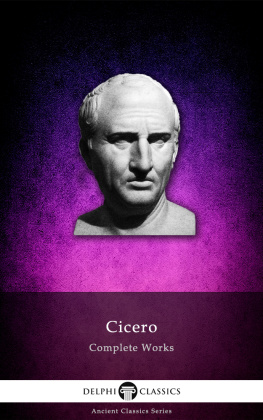The Lost Republic

Oxford University Press is a department of the University of Oxford. It furthers the Universitys objective of excellence in research, scholarship, and education by publishing worldwide. Oxford is a registered trade mark of Oxford University Press in the UK and certain other countries.
Published in the United States of America by Oxford University Press
198 Madison Avenue, New York, NY 10016, United States of America.
Oxford University Press 2022
All rights reserved. No part of this publication may be reproduced, stored in a retrieval system, or transmitted, in any form or by any means, without the prior permission in writing of Oxford University Press, or as expressly permitted by law, by license, or under terms agreed with the appropriate reproduction rights organization. Inquiries concerning reproduction outside the scope of the above should be sent to the Rights Department, Oxford University Press, at the address above.
You must not circulate this work in any other form
and you must impose this same condition on any acquirer.
Library of Congress Control Number: 2022901731
ISBN 9780197626092
eISBN 9780197626115
DOI: 10.1093/oso/9780197626092.001.0001
In memory of my brother, Robert Guttman (19282019)
You must remember that each of us was born not for himself alone, but our country takes a share of our existence, and so do our parents, so do our friends.... And when our country calls us to take part in public affairs, it would be foolish not to obey.
[plato], Ninth Letter
Contents
in the fall of 2018, Clifford Ando invited me to give a course on De oratore Book 1 at the University of Chicago, thus providing the occasion for me to revisit the text and to begin writing this book. I am most grateful to Cliff for the invitation and to the members of the Department of Classics at Chicago for their generous conversation and company, to the students in the class, particularly Huaxi Zhou, for raising questions that I had not previously encountered, and above all to Diana and Peter White for their hospitality and friendshipincluding the loan of Peters office, where I began to write this book.
My desire to write about Ciceros dialogues goes back much further than that. In the spring of 1966 I first read De oratore at the suggestion and under the guidance of Glen Bowersock, a suggestion for which I have been indebted to him ever since. My interest in the settings of the dialogues and Ciceros presentation of Romes intellectual history dates from that semester, and while I hope I have learned something more about Cicero since then, echoes of the paper I wrote in 1966 are still to be found in the present book.
De oratore and De re publica are closely linked in my life as in Ciceros. By chance, I was able to take a course on De re publica with the late Herbert Bloch one semester after first reading De oratore. Some years later, when I suggested De oratore Book 1 to the late Ted Kenney as a suitable text for a Green and Yellow, he proposed De re publica. When I tried, as I have more than once, to write a book about De re publica, a chapter on the relationship between the two dialogues kept inserting itself and growing out of all proportion. In 2018 I gave in to the logic of the argument and began to write a book about both dialogues together.
I have been studying these texts for too long for me to thank all the friends and students whose advice and suggestions have found their way into this book, but I want to acknowledge one large debt from long ago. I met the late Elizabeth Rawson in the fall of 1975, and from then until her untimely death in 1988 she gave me much-needed encouragement and advice about Cicero. More recently, I am grateful to Catherine Steel for reading a draft of Berg for comments on the final draft of the book, and to John Ramsey for advice on any number of questions concerning law and trials. Katharina Volk has read the entire book, parts of it more than once, and made great improvements to both its substance and its style, as she has to all aspects of my life; without her help and companionship I would not have been able to write this book. So too, without the skillful, kind, and professional ministrations of Dr. Israel Deutsch and his staff (I thank particularly Brian, Cassandra, Errol, and Flavia), I might not have been able to finish it. Bob Kaster and Catherine Steel read the entire manuscript for Oxford University Press and gave me acute and copious suggestions for improvement, almost all of which I have incorporated. Stefan Vranka of OUP has offered wise and helpful suggestions. All translations are my own; those from De re publica are taken from James E. G. Zetzel (Ed.), Marcus Tullius Cicero, Cicero: On the Commonwealth and On the Laws, 2nd Edition Cambridge University Press 2017, and are used by permission. All references to De re publica use the section and fragment numbers of my translation.
Cicero dedicated De oratore and De re publica to his brother; I am dedicating this book to the memory of mine, who died while I was writing it. Like Cicero, he endured (with rather more steadfastness) exile, war, and loss; and like Cicero, he believed in the values expressed in my epigraph: devotion to family and to public service.
New York
May 27, 2021
In addition to familiar abbreviations for periodicals and ancient texts, the following are used here:
| FRHist | T. J. Cornell, ed., The Fragments of the Roman Historians. Oxford, 2013. |
| LPW | M. Tullius Cicero: De Oratore Libri III. |
| Vol. 1, ed. A. D. Leeman and H. Pinkster. Heidelberg, 1981. |
| Vol. 2, ed. A. D. Leeman, H. Pinkster, H. Nelson. Heidelberg, 1985. |
| Vol. 3, ed. A. D. Leeman, H. Pinkster, E. Rabbie. Heidelberg, 1989. |
| Vol. 4, ed. A. D. Leeman, H. Pinkster, J. Wisse. Heidelberg, 1996. |
| Vol. 5, ed. J. Wisse, M. Winterbottom, E. Fantham. Heidelberg, 2008. |
| MRR | T. R. S. Broughton, Magistrates of the Roman Republic. New York, 195186. |
| ORF | E. Malcovati, ed. Oratorum Romanorum Fragmenta liberae rei publicae. Ed. 4, Turin, 1976. |
| TLRR | M. Alexander, Trials in the Late Roman Republic 149bcto 50bc. Toronto, 1990. |
The letter to Lentulus is organized as a response to questions about Ciceros political behavior: after being for his entire career a resolute supporter of the senatorial order, how could Cicero suddenly change in 55 and 54 and deliver speeches in support of Caesar and in defense of Vatinius, a man he loathed and had previously savaged in the trial of Sestius in 56? Cicero reminds Lentulus and other readers of what had happened to him since his consulate and of how badly he felt treated by the optimates at the time of his exile in 58, stressing (with some exaggeration) his long-term support for, and from, Pompey: why should Cicero stick his neck out for fair-weather friends against the man who actually helped him? He also points out the risks such action would entail: he describes his vigorous senatorial speeches of early 56 and opposition to the triumvirs, and then the aftermaththe conference at Lucca, which led to Pompeys telling Cicero in no uncertain terms not to oppose Caesar, and reminding Cicero of his obligations to Pompey and thus indirectly to Caesar too; that Ciceros brother Quintus was in Gaul as Caesars legate, and thus under Caesars surveillance, had some effect as well. Cicero, in practical terms, had little choice but to toe the line.

